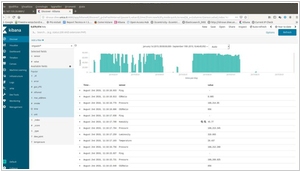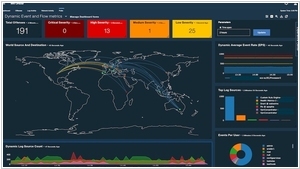ElasticSearch vs IBM QRadar
August 06, 2023 | Author: Michael Stromann
See also:
Top 10 Big Data platforms
Top 10 Big Data platforms
Elasticsearch and IBM QRadar are two distinct solutions with different focuses in the realm of data management and cybersecurity.
Elasticsearch, as mentioned earlier, is an open-source distributed search and analytics engine designed for fast data indexing and retrieval. It is commonly used for log aggregation, application performance monitoring, and full-text search. Elasticsearch provides a versatile and scalable platform for exploring and visualizing large volumes of data, making it a valuable tool for businesses seeking insights from their data. It can be integrated with various other components of the Elastic Stack, such as Kibana for data visualization and Logstash for data ingestion and processing, to form a comprehensive data analytics solution.
On the other hand, IBM QRadar is an enterprise-grade security information and event management (SIEM) platform. It is designed specifically for cybersecurity use cases, such as threat detection, incident response, and compliance management. IBM QRadar offers powerful capabilities to collect, process, and analyze security-related data from diverse sources, including network devices, security appliances, and applications. It performs real-time event correlation and applies advanced analytics to identify potential security threats and anomalies. QRadar provides comprehensive dashboards and reports to aid in security monitoring and compliance reporting.
See also: Top 10 Big Data platforms
Elasticsearch, as mentioned earlier, is an open-source distributed search and analytics engine designed for fast data indexing and retrieval. It is commonly used for log aggregation, application performance monitoring, and full-text search. Elasticsearch provides a versatile and scalable platform for exploring and visualizing large volumes of data, making it a valuable tool for businesses seeking insights from their data. It can be integrated with various other components of the Elastic Stack, such as Kibana for data visualization and Logstash for data ingestion and processing, to form a comprehensive data analytics solution.
On the other hand, IBM QRadar is an enterprise-grade security information and event management (SIEM) platform. It is designed specifically for cybersecurity use cases, such as threat detection, incident response, and compliance management. IBM QRadar offers powerful capabilities to collect, process, and analyze security-related data from diverse sources, including network devices, security appliances, and applications. It performs real-time event correlation and applies advanced analytics to identify potential security threats and anomalies. QRadar provides comprehensive dashboards and reports to aid in security monitoring and compliance reporting.
See also: Top 10 Big Data platforms





